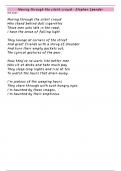Statistiek 1 3-9-2018 periode 1
Tutorial 1
Research
Waarover? -> Research question ( Do children whose mothers smoked during pregnancy often have
a lower birth weight?)
Waaraan -> Population ( All pregnant women in the Netherlands 2017 – volledig beeld populatie- ) ->
sample ( selection of pregnant women… ) -> units
Wat? -> variable
Population : every member of a group ( persons, objects etc) for which we would like to
collect information ( langste beschrijving -> volwassen koeien v/e bepaald ras) all…
Sample: part of the population that we will study and collect information for ( why? - Too
expensive or too time consuming to question al pregnant women )
Units : the elements of a sample wich at we are gathering information ( kortste beschrijving :
plant, dier mens etc.)
Variable :
- Quantitative variable kwantitatief ( continuous/ discrete )
Continuous = alle getallen worden bereikt ( tot zoveel cijvers achter de komma)
discrete = losse uitkomsten ( aantal kinderen : 1 of 2) ( number of)
- Qualitative variable kwalitatief ( nominal / ordinal )
Nominal ( geen orde in)
Ordinal ( rangorde) kwaliteit van een ei/ hoe leuk / naar oordeel
Simple random sampling = SRS ( alle eenheden in de populatie zouden getrokken kunnen worden)
(elke soort steekproef zou getrokken kunnen worden ) -> zorgt ervoor dat je niet bepaalde mensen
gaat selecteren. ( alle samples moet kunnen )
Niet : 50 appels uit 50 verschillende kisten
5 appels uit 5 verschillende bomen
Belangrijk!
- undersampling
- Non-response
- volunatry participation (sterke mening)
- response bias ( te persoonlijke vragen)
Research
- Observational : observe the unit/ process without influencing it
- experimental : apply a treatment to the unit to observe the reaction ( alleen maar oorzaal gevolg bij
deze mogelijk)
, Statistiek 1 3-9-2018 periode 1
Tutorial 2
Investigating salt in bread
population : all loaves of bread sold in de Netherlands
Units : loaves of brad
Variable : amount of salt in bread
y 1+ y 2 … .
Mean = gemiddelde : Ӯ =
n=totaal een h eden
Median (M) = rangschik klein -> groot en dan middelste waarneming van oneven aantal
- met even aantal neem je het gemiddelde van de middelste twee.
Als Mean en Median overeenkomen dan … geen outliers
The Median is not sensitive to outliners (en daardoor soms een betere maat om aan te geven wat er in het
midden wordt gedaan ) the Mean is very sensitive to outliners
Min <-> max = ---range---
Standard deviation (s) = standaard afwijking = √ variance
Interquartile range (IQR) ( kwartielafstand) = Q3-Q1
- Q1 = 1st quartile = 25% = lower quartile ( Mediaan eerste helft)
- Q3 = 3rd quartile = 75% = upper quartile ( Mediaan tweede helft)
interquatile range is not sensitive to outliers in contrast tot he variance
- the Median is also called the 2nd quartile / or the 50th percentile ( je hebt evenveel
waarnemingsgetallen voor de Mediaan als na de Mediaan.
Heb je 15 waarnemingin is 1st quartile = 0,25 x 15 = 3.75 dus 4 e waarneming ( altijd naar boven
afronden)
Kans berekenen
Frequency -> probabililty
Law of large numbers: hoe meer je hebt ( experimenten) hoe nauwkeuriger je uitkomst is.
The more times you observe a random event the frequentie will approach its theoretical probability.
probability = relatieve frequentie op de lange termijn.
n = number of persons
y = variable
p = probability
( zie powerpoint)
alle kansen bij elkaar = altijd 1/ 100%
The complement _A is alles wat niet A is.
the event union AcB
Tutorial 1
Research
Waarover? -> Research question ( Do children whose mothers smoked during pregnancy often have
a lower birth weight?)
Waaraan -> Population ( All pregnant women in the Netherlands 2017 – volledig beeld populatie- ) ->
sample ( selection of pregnant women… ) -> units
Wat? -> variable
Population : every member of a group ( persons, objects etc) for which we would like to
collect information ( langste beschrijving -> volwassen koeien v/e bepaald ras) all…
Sample: part of the population that we will study and collect information for ( why? - Too
expensive or too time consuming to question al pregnant women )
Units : the elements of a sample wich at we are gathering information ( kortste beschrijving :
plant, dier mens etc.)
Variable :
- Quantitative variable kwantitatief ( continuous/ discrete )
Continuous = alle getallen worden bereikt ( tot zoveel cijvers achter de komma)
discrete = losse uitkomsten ( aantal kinderen : 1 of 2) ( number of)
- Qualitative variable kwalitatief ( nominal / ordinal )
Nominal ( geen orde in)
Ordinal ( rangorde) kwaliteit van een ei/ hoe leuk / naar oordeel
Simple random sampling = SRS ( alle eenheden in de populatie zouden getrokken kunnen worden)
(elke soort steekproef zou getrokken kunnen worden ) -> zorgt ervoor dat je niet bepaalde mensen
gaat selecteren. ( alle samples moet kunnen )
Niet : 50 appels uit 50 verschillende kisten
5 appels uit 5 verschillende bomen
Belangrijk!
- undersampling
- Non-response
- volunatry participation (sterke mening)
- response bias ( te persoonlijke vragen)
Research
- Observational : observe the unit/ process without influencing it
- experimental : apply a treatment to the unit to observe the reaction ( alleen maar oorzaal gevolg bij
deze mogelijk)
, Statistiek 1 3-9-2018 periode 1
Tutorial 2
Investigating salt in bread
population : all loaves of bread sold in de Netherlands
Units : loaves of brad
Variable : amount of salt in bread
y 1+ y 2 … .
Mean = gemiddelde : Ӯ =
n=totaal een h eden
Median (M) = rangschik klein -> groot en dan middelste waarneming van oneven aantal
- met even aantal neem je het gemiddelde van de middelste twee.
Als Mean en Median overeenkomen dan … geen outliers
The Median is not sensitive to outliners (en daardoor soms een betere maat om aan te geven wat er in het
midden wordt gedaan ) the Mean is very sensitive to outliners
Min <-> max = ---range---
Standard deviation (s) = standaard afwijking = √ variance
Interquartile range (IQR) ( kwartielafstand) = Q3-Q1
- Q1 = 1st quartile = 25% = lower quartile ( Mediaan eerste helft)
- Q3 = 3rd quartile = 75% = upper quartile ( Mediaan tweede helft)
interquatile range is not sensitive to outliers in contrast tot he variance
- the Median is also called the 2nd quartile / or the 50th percentile ( je hebt evenveel
waarnemingsgetallen voor de Mediaan als na de Mediaan.
Heb je 15 waarnemingin is 1st quartile = 0,25 x 15 = 3.75 dus 4 e waarneming ( altijd naar boven
afronden)
Kans berekenen
Frequency -> probabililty
Law of large numbers: hoe meer je hebt ( experimenten) hoe nauwkeuriger je uitkomst is.
The more times you observe a random event the frequentie will approach its theoretical probability.
probability = relatieve frequentie op de lange termijn.
n = number of persons
y = variable
p = probability
( zie powerpoint)
alle kansen bij elkaar = altijd 1/ 100%
The complement _A is alles wat niet A is.
the event union AcB




